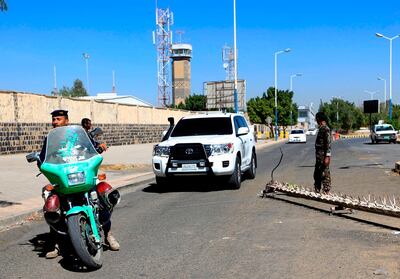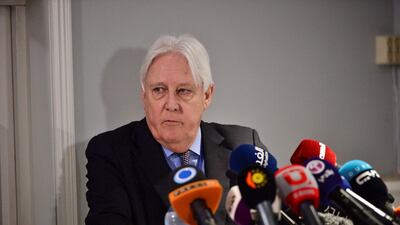The timeline for the implementation of the UN-brokered deal in Yemen has been extended, the global body's special envoy to the war-torn country said on Monday.
In tweets confirming the decision, Martin Griffiths also conceded that the initial timeline was ambitious.
There is a complex situation on the ground, Mr Griffiths said, adding that both the Yemeni government and Houthi rebels were "constructively and seriously engaged" in the agreement.
The two sides agreed to a ceasefire in Hodeidah, which went into effect on December 18, the withdrawal of all forces from the city's three ports and a prisoner exchange at UN-brokered negotiations in Sweden in December.
A troop withdrawal from Hodeidah would mark a turning point, Mr Griffiths said.
Suspected breaches of the ceasefire by Houthi rebels have marred the implementation of the deal, including sporadic clashes and mortar fire.
The UN envoy said it was important to capitalise on the momentum from the deal brokered in Sweden and that the implementation of the Hodeidah agreement "will have a large impact on the dynamics of conflict resolution in Yemen".
Mr Griffiths also stressed the importance of not losing sight of the bigger picture in Yemen and said that "all parties are on the same page that the way to do this is through the negotiations’ table, and not the battlefield".
Shortly after announcing the extension, Mr Griffiths arrived in Sanaa, the rebel-held capital, on a surprise visit to discuss the situation in and around Hodeidah.
It is the UN official's third trip to Yemen this month as he pushes for the implementation of the deal.

Meanwhile, the Arab Coalition support the government announced that the rebels are blocking six humanitarian aid ships from unloading at Hodeidah.
The city is the entry point for about 70 per cent of Yemen's humanitarian aid and food imports. Four years of war following the rebel seizure of Sanaa in 2014 have left more than 22 million Yemenis – 75 per cent of the population – dependent on aid, according to UN agencies.
The UN fears that a full-blown conflict in Hodeidah will cut off the flow of aid to people in need, endangering millions of lives.
Martin Griffith's comments in full:

